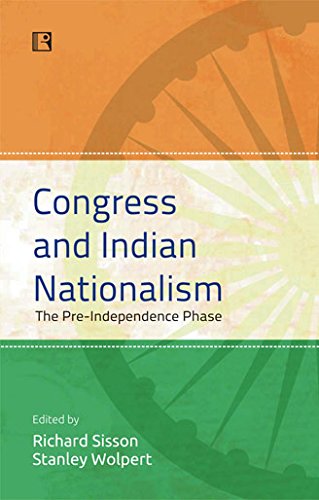CONGRESS AND INDIAN NATIONALISM:: The Pre-Independence Phase
CONGRESS AND INDIAN NATIONALISM:: The Pre-Independence Phase is backordered and will ship as soon as it is back in stock.
Couldn't load pickup availability
Genuine Products Guarantee
Genuine Products Guarantee
We guarantee 100% genuine products, and if proven otherwise, we will compensate you with 10 times the product's cost.
Delivery and Shipping
Delivery and Shipping
Products are generally ready for dispatch within 1 day and typically reach you in 3 to 5 days.
Book Details
-
Author: Richard Sisson, Stanley Wolpert
-
Publisher: Rawat Publications
-
Language: English
-
Edition: 2017
-
ISBN: 9788131608760
-
Pages: 430
-
Cover: Hardcover
-
Dimensions: 9.4 x 6.5 x 1.4 inches
-
Sale Territory: India
About the Book
This volume brings together seventeen distinguished historians and political scientists who offer a fresh and critical perspective on the evolution of Indian Nationalism during the pre-independence phase, one hundred years after the founding of the Indian National Congress. They analyze the Congress Party’s role as India's foremost political institution, reflecting the aspirations, ideals, struggles, and contradictions faced by the country in its fight for nationhood.
The book critically examines several challenges faced by the pre-independence Indian National Congress for the first time, exploring crucial periods of crisis and transition. It addresses the tension between mass mobilization and political control, as well as the complexities of maintaining unity amidst the diverse social, economic, and religious divides in Indian society. The portrait of the Congress Party that emerges is one of a coalition of conflicting communities and interests, much like India itself, tenuously united by a common adversary—the British colonial empire.
Through shifting alliances and elite political maneuvering, the Congress Party remained resilient long enough to convince the British that it would be easier to “Quit India” than to maintain control by force. Following the abrupt transfer of power in 1947, Congress provided the institutional foundation for governing the newly independent countries of India and Pakistan.
Contributors such as S. Bhattacharya, Zoya Hasan, Gyanendra Pandey, and others provide critical insights into the relationship between Congress, social representation, mass mobilization, and political control, especially in relation to issues like caste, class, and the Muslim question. The volume is a comprehensive study of the complexities that shaped India's nationalist experience and offers valuable lessons for understanding other post-colonial states.





